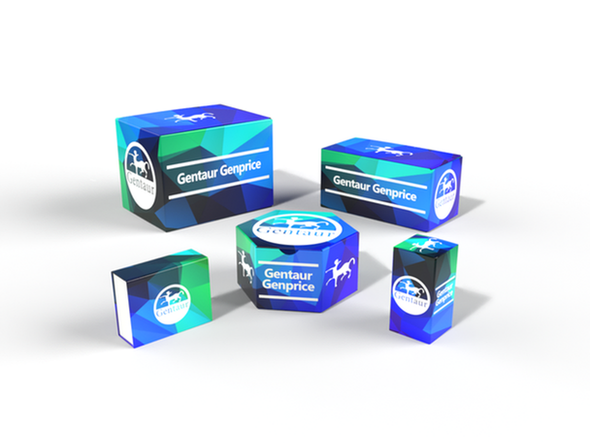Description
TNF-a Antibody (biotin) | XP-5284Bt | Gentaur UK, US & Europe Distribution
Host: Rabbit
Reactivity: Mouse
Homology: N/A
Immunogen: Produced from sera of rabbits pre-immunized with highly pure (>98%) recombinant mTNF-α (murine TNF-alpha) .
Research Area: Immunology, Chemokines & Cytokines, Signal Transduction, Growth Factors, Antibody Pairs
Tested Application: E, WB
Application: ELISA:
Sandwich:
To detect mTNF-α by sandwich ELISA (using 100 μL/well antibody solution) a concentration of 0.25 - 1.0 μg/mL of this antibody is required. This biotinylated polyclonal antibody, in conjunction with our Polyclonal Anti-Murine TNF-α (XP-5284) as a capture antibody, allows the detection of at least 0.2 - 0.4 ng/well of recombinant mTNF-α.
Western Blot:
To detect mTNF-α by Western Blot analysis this antibody can be used at a concentration of 0.1 - 0.2 μg/mL. Used in conjunction with compatible secondary reagents the detection limit for recombinant mTNF-α is 1.5 - 3.0 ng/lane, under either reducing or non-reducing conditions.
Specificiy: N/A
Positive Control 1: N/A
Positive Control 2: N/A
Positive Control 3: N/A
Positive Control 4: N/A
Positive Control 5: N/A
Positive Control 6: N/A
Molecular Weight: N/A
Validation: N/A
Isoform: N/A
Purification: Anti-mTNF-α specific antibody was purified by affinity chromatography and then biotinylated.
Clonality: Polyclonal
Clone: N/A
Isotype: N/A
Conjugate: Biotin
Physical State: Lyophilized
Buffer: N/A
Concentration: N/A
Storage Condition: TNF-a antibody is stable for at least 2 years from date of receipt at -20˚C. The reconstituted antibody is stable for at least two weeks at 2-8˚C. Frozen aliquots are stable for at least 6 months when stored at -20˚C. Avoid repeated freeze-thaw cycles.
Alternate Name: DIF, Tnfa, TNF-a, TNFSF2, Tnfsf1a, TNFalpha, TNF-alpha, Tnfsf2, Tumor necrosis factor, Cachectin
User Note: Centrifuge vial prior to opening.
BACKGROUND: Tumor Necrosis Factor Alpha (TNF alpha) is a protein secreted by lipopolysaccharide stimulated macrophages, and causes tumor necrosis when injected into tumour bearing mice. TNF alpha is believed to mediate pathogenic shock and tissue injury associated with endotoxemia.






